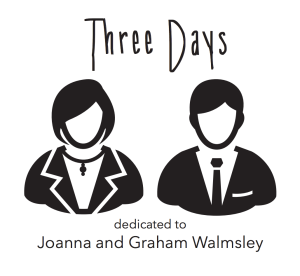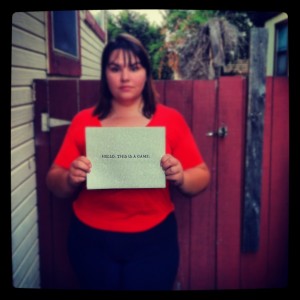This is the talk on Games and Intimacy that I gave at Now Play This on Friday.
*
Many of my favorite games to write have been written for specific people.
As indie designers, we talk about writing for the market (which involves a lot of guessing, because who can read the minds of the masses?) or writing for ourselves, to create the game that we most want to play or the game that expresses some deep-held belief or the game that fits our artistic vision. And then a lot of people sink their teeth into one of those approaches and growl at anyone who tries to take it away. Like it’s not realistic to write for yourself, or it’s not honest to write for a large audience.
But there’s a third option, which is to write for a specific recipient or a small group of recipients that you know personally. And that’s actually how a lot of us start, of course. The first computer game I ever completed, I wrote for my little brother because he was bored with math. It was a dungeon where the monsters asked you arithmetic questions as a form of combat. Astonishingly he liked it, which shows you something about the power of personalization.
* For someone else’s friend
Once as part of a charity auction, I auctioned off a small work of custom interactive fiction. The person who bought it asked me to write a game for her brother. She told me about the kinds of games he liked to play and the puzzles he’d enjoyed in the past, and she asked me to set it in a particular fan universe I’m also fond of.
Even though I didn’t know the recipient myself, I really enjoyed working on this project. Game design best practices are often about trying to suit the largest number of people and accommodate different play styles, but when you have one person in mind, when you know what that person likes to do in games, you know what that person is likely to find funny, you can calibrate every aspect so much more tightly. The game rewards are rewards FOR YOU.
* For a collaborator, then the general public
One of my larger on-going projects is providing support for the text adventure tool Inform 7. One of the things I do for that project is provide small — in some cases really tiny — example games, showing off all kinds of code functionality. Over the years I’ve written nearly five hundred of these, and while they were written for the broader Inform community in the long run, their first reader has always been my collaborator on the project, Graham Nelson. So I want to make them amusing and enjoyable in general, but there has always been that additional point of wanting to entertain him personally — especially since he was often reading over the examples I submitted as break from doing some boring or arduous batch of bug-fixing.
And, full disclosure, partway through this project I married him, so we have a lot of shared history.
The result is that those example games are now like a stratified record of shared references, TV shows we were both watching, places we’ve been on vacation, disagreements we were having about game design.
* For a friend
Many years ago some of my friends and I got really into buying and trading perfume oil from Black Phoenix Alchemy Lab. If you’re not familiar with this, it’s an online perfume shop from which you can buy tiny bottles of perfume oil with names like Tezcatlipoca and Severin. Their perfumes are designed after Neil Gaiman characters and voodoo spirits and ancient lost cities; the descriptions of their perfumes are some of the most evocative advertising copy on the internet. And they send samples, but you can never get samples of everything because their product line runs to the hundreds, or maybe even the thousands at this point.
So my friends and I would order these perfume samples, keep the ones we liked, and swap the ones we didn’t like. At one point, I’d decided that when I mailed perfume samples to my IF-loving friends, I would also send along some tiny little IF games that were based on the scents. It felt like a more creative way of doing a review, which had been our custom up to that point.
To a friend who wrote gorgeous surreal IF, I sent a little interactive machine room in which the devices controlled different scent notes. That friend has a really lovely, spare prose style, so I found myself concentrating on my prose, trying to make it worthy of the recipient.
To another friend who was a Harry Potter fan and Snape enthusiast, I sent a small scene set in the Potions classroom, in which the samples I was sending were all Potions ingredients. If you solved its main puzzle and figured out which of the three perfumes I personally liked best, you got an ending that shipped two characters she liked to see together.
One of the things I look for when I’m writing is the moment when a passage rings true. This is so much an intuitive measure that I can’t provide any objective qualifiers for it. It’s different from thinking that something is clever or funny when I write it, though: instead it’s an experience I have when I’m reading it back, and think, “Yeah, that’s right.” What I write for specific people, though, has to ring true in the context of what I know about them.
This is not the kind of game I’d ever write and release for the general public, even if there were some niche audience of Snape-loving BPAL fans who happened to have the exact same three perfume samples that I put in the game, but in the context of this particular friendship it felt really cool.
It was a goofy way to spend a couple of afternoons on vacation. I never would have written those pieces for myself. They were like letters, and had as much to do with the recipient as with me.
* For an Occasion – San Tilapian Studies
 These are props from a game called San Tilapian Studies. I wrote it for my engagement party, which was held in the United States. Graham is British, and we had our wedding reception in the UK, so the engagement party was the only chance for a lot of my Seattle friends to come to some kind of wedding celebration.
These are props from a game called San Tilapian Studies. I wrote it for my engagement party, which was held in the United States. Graham is British, and we had our wedding reception in the UK, so the engagement party was the only chance for a lot of my Seattle friends to come to some kind of wedding celebration.
So I had this mixed group of people. Some of them were serious gamers, in the video game or RPG space. Some were old family friends who didn’t play a lot of games but liked to read. A couple were historians, and a number had an academic background of some sort. Meanwhile, my husband and I both write games, and this is how we met. So it felt like a natural thing to solve the social challenge of getting people to know each other by making a game just for this setting.
The idea of San Tilapian Studies is that everyone gets a couple of stickers. The stickers come in three colors, and the colors correspond to nouns, adjectives, and a description of a function. So for instance “a ball of string”, “ten feet wide”, and “that got lost in the desert.” The challenge was to wander around with your sticker and find two other people with different-colored stickers to combine with yours to create a whole object description. Then you put the stickers into a notebook and wrote a description of how this object contributed to the history of the fictional kingdom of San Tilapia. It gave people an opportunity to wander around and show each other conversation prompts and share (in a light-hearted way) their skills in storytelling, drawing, history, or parody of academic prose.
Because this was a special-occasion game, it could be more expensive and less reusable than most games. It uses a combination of custom and found materials: stickers that you print and only use once, postcards and paper ephemera that I bought at an antique paper shop a few blocks from my apartment. My sister was helping me throw the party and she helped me put together the game props too.
After you’ve played San Tilapian Studies once, you have a physical book. I keep my engagement party book on my shelf at home, an idiosyncratic sort of wedding album. I never know what to write in people’s wedding albums anyway.
* Private games by other people
I don’t want to suggest that I’ve somehow discovered this niche form of games practice that no one else does. I know there are other people who write each other IF and Twine games, and maybe other kinds of games, as well. But precisely because they’re in the private sphere, we mostly don’t get to hear about them. Here are a handful that I do know about because, after making them, the creators chose to share, or I just happened to be in the right place at the right time:
Three Days is a tabletop storygame Avery dedicated to a couple of her friends, based on the story of how they met. She describes it as “a romantic comedy for two players, one of whom can knit.” One of the things about writing games for specific players is that it’s not unreasonable to incorporate their life skills into your game.
Mattie Brice’s games Mainichi and EAT were created for particular friends. EAT is a budgeting game in which you have only set sources of income and certain fixed expenses, and you have to try to make it through without going broke — a way of explaining all the pressures on her life through a systemic representation, in response to someone who was giving her well-meant but unhelpful advice.
Deadbolt, by Elizabeth Sampat, is a live game in which you answer difficult questions for the circle of other players, though you control how much detail you give and even whether you share what the question was, so it is fairly good at honoring personal boundaries. It’s thus both safer and able to go deeper than the truth-or-dare sorts of games we played in junior high.
To help ensure the safety of the experience, Elizabeth does not sell the game and only ever runs it herself; you cannot play it without her.
So these are also private games but designed for a different purpose than most of my private games: in the case of EAT, to make a systems-based argument to someone who wasn’t understanding other kinds of argument, and in the case of Deadbolt, to generate intimacy among former strangers who had consented to participate.
* Why don’t we do this more?
Writing for individuals and small groups is rare, I think for obvious reasons. It takes a lot of effort to make a game, and then having only one player or a few players sometimes seems like a waste.
And because it’s a lot of work, sometimes it might seem like a big gesture. I have a few people I might want to write a game for, because their work inspired me or because I have a really specific game idea that I think they’re unusually likely to appreciate, but we’re not really that close and I don’t weird them out, like I’m giving them a mix tape or something. (I know no one gives mix tapes any more, but I have no idea what has supplanted that cultural function. Maybe nothing?)
Also, as I do more game writing for a living, I’ve become less certain about what I might be signaling by giving it away, and more cautious about circulating small unpolished pieces.
So a lot of the time it doesn’t accomplish a lot of practical aims, making games for individual players or small, close groups. I get that. But there’s a challenge and a pleasure about trying to make something that’s well suited for a particular person who has known likes and dislikes.
Writing private games is somewhere between writing poetry under constructive constraints, and baking your lover a birthday cake. It teaches you something about yourself, and something about the person you’re creating for, and it communicates your affection and respect for them. Which is pretty great. And if we ever lived in a universe where income wasn’t an issue, a lot more of my games would be written for my friends.
And even if we don’t or can’t do this all the time, writing some games for friends helps – well, at least, it helps me – resolve some of the false market-vs-art dichotomy. The things that we make don’t have to be only for ourselves or only for someone else: they can be both. They can be honest and still accommodate someone else’s truth.




This is awesome. And kind. And thoughtful. Very cool.
This use seems particular to this style of game, not just their size. Stone Librande’s private games for his family, for example, have never really tread into this “meaningful” territory. Mine for my wife don’t. Mix tapes is an interesting comparison. Lots of words might be key to this particular magic? The meaning here is much deeper and… more direct then games with a non-narrative focus on. It’s possible, just a much higher barrier of entry.
It reminds me of this blog. I know you don’t write for me personally, but you share a lot of yourself here, and I feel closer to you because of it. I appreciate that.
Aw, thanks.
I know no one gives mix tapes any more, but I have no idea what has supplanted that cultural function.
Spotify playlists?
10/10 can confirm that does happen. My friend made playlists for each girl in our class, all based on what she knew of our listening history.
Really enjoyed this. San Tilapan Studies sounds like a ton of fun as a party/event game.
‘Writing private games is somewhere between writing poetry under constructive constraints, and baking your lover a birthday cake’. As someone who both writes poems and bakes cakes, I loved this.
Hello! I don’t usualy reply to stuff but reading this article made me realise that the only game I have ever finished was for a group of friends that I used to run a D20 Modern game for. It was just a small Renpy game based around their characters but it was great fun to make and I wasn’t worried about it being rough around the edges.
It just makes me wonder how many other people do this but just never talk about it?
I feel like there is an idea for a game jam here.
I think a lot of people do this, but yeah, we just don’t necessarily hear about it.
re: game jam potential: Has this been done as a Secret Santa, where each participant writes a small game for a random other participant?
re: personalized games: I’m not gonna blow up my partner’s spot *too* much but I will say that I’m very lucky in this regard (just got a personalized ASMR video last night!!) & feel like I need to step up my reciprocation game.
One small game I wrote very literally saved my marriage. it made my wife relive the many great (and some sad) things we had experienced together. It was easy in the sense that her memories would do all of the scenery and atmosphere building – but it was quite hard in other ways.
I was teaching myself iPhone programming years ago and decided to make a game for my wife. She spent a lot of time playing a crappy free solitaire game with adds and crap so I decided to write a copy of it, and personalize it for her. I used pictures from our wedding and honeymoon as backgrounds, and included a bunch of easter eggs:
– When you get half-way through, a picture of our dog would pop up and congratulate you.
– If she played at work (location services: enabled!) a picture of her dad would pop up and scold her.
– If you gave up on a game, you would be forced to watch her favorite gifs of children falling down…
It was so much fun to secretly make, and I ended up giving it to her for Christmas. Unfortunately I never updated it or kept paying Apple $100/year so its no longer on the app store.